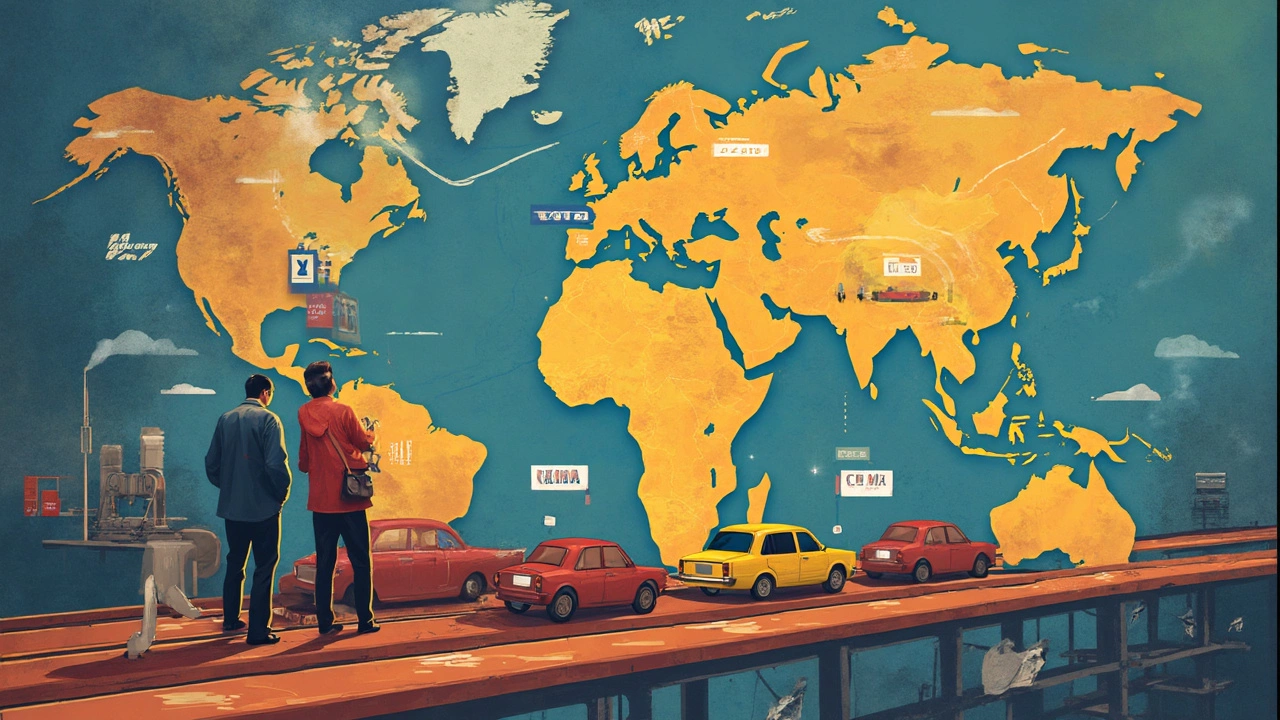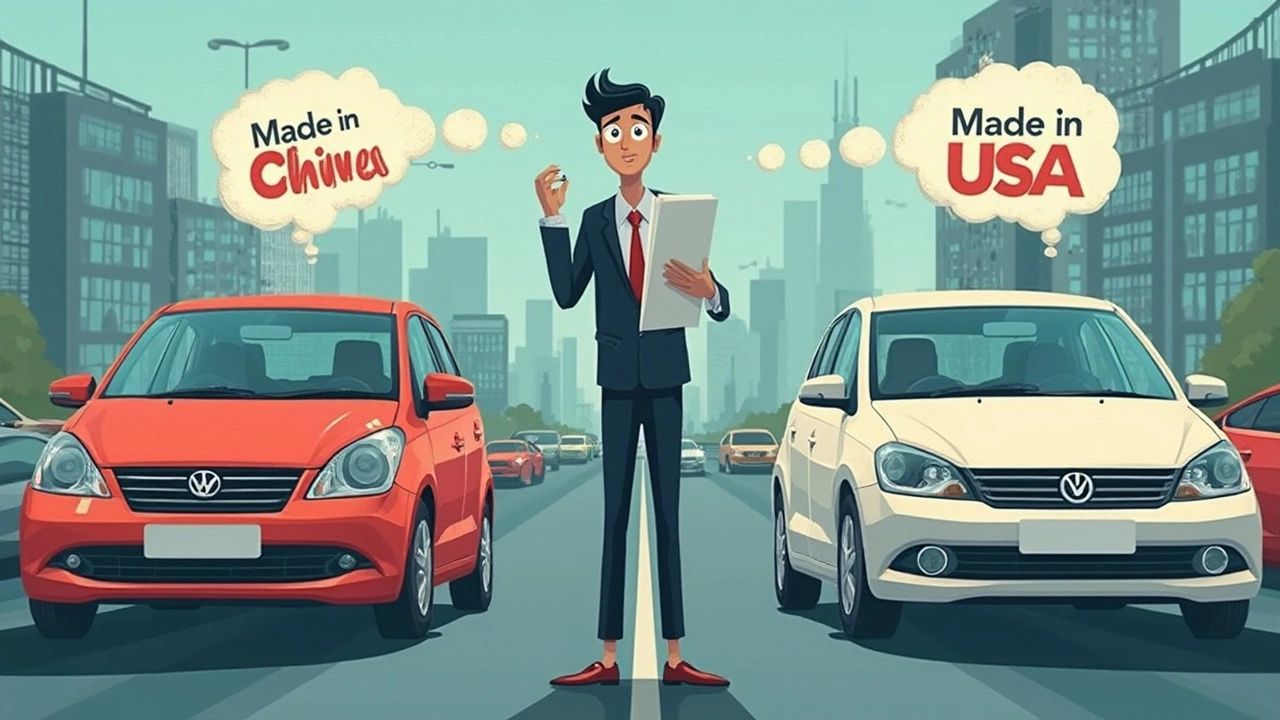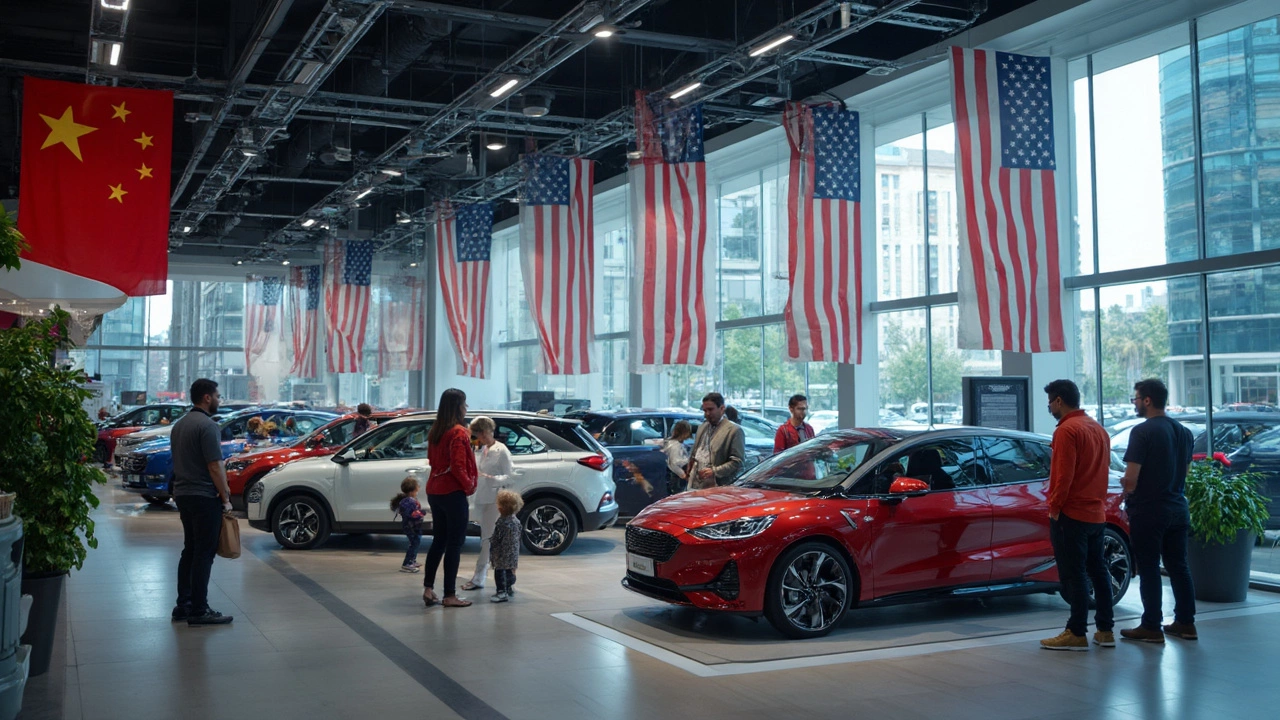You won't see showrooms packed with Chinese car brands in the US, but that's not the whole story. Some cars rolling off the ship at American ports are actually made in China—you just might not notice because they wear logos you already know, like Volvo or Buick. Weird, right?
To answer the big question: yes, cars made in China are sold in the US, though they're mostly from established global brands. Car companies set up plants in China for a few smart reasons—cheaper labor, access to massive factories, and a government that's hungry for global business. For example, General Motors builds the Buick Envision in China and ships it to the US. Volvo does the same with the S90 sedan. These aren’t some wild experiments; these models have been selling in the US for years.
- Chinese-Made Cars in the American Market
- Why Automakers Build Cars in China
- Which Companies Sell Chinese-Made Cars in the US?
- Barriers and Controversies
- What This Means for Car Buyers
Chinese-Made Cars in the American Market
Most people don’t realize there are already China-built cars driving around American streets. But the truth is, while you won’t spot a flashy showroom selling a brand called "Geely" or "Chery" in the US, big-name carmakers are quietly importing a handful of models made in China.
The China cars connection started picking up steam around 2015. The first Chinese-built car to break through was the Volvo S60 Inscription. After that, General Motors jumped in with the Buick Envision. These vehicles are built in massive modern factories in China, then shipped straight to US dealerships.
Not a ton of models are shipped this way, but it’s happening enough to make a dent. Here’s a quick look at which Chinese-made cars have been sold in the US in the past few years:
- Buick Envision (SUV)
- Volvo S60 Inscription and S90 (Sedans)
- Polestar 2 (Electric car, for a short time)
- Lincoln Nautilus (starting with the 2024 model)
For perspective, take a look at these recent numbers:
| Model | US Units Sold in 2023 | Built in China? |
|---|---|---|
| Buick Envision | 64,000 | Yes |
| Volvo S90 | 4,350 | Yes |
| Lincoln Nautilus (2024 launch) | -- | Yes (for 2024 and beyond) |
Now, these numbers are small compared to the millions of cars Americans buy each year, but it shows China isn’t just dumping cars into the US market—the ones that make it over are targeted, higher-end models. Car companies use China as a "factory for the world," not just for cheap goods but for luxury and electric vehicles, too.
If you’re car shopping, you probably won’t even notice the difference—these cars have the same badges, warranties, and dealer support. But if you look at the window sticker, you might spot "assembled in China"—a silent signal of how global car manufacturing has become.
Why Automakers Build Cars in China
Here’s the thing: automakers aren’t building cars in China just for fun. The real draw comes down to saving money and reaching a massive customer base. Chinese factories offer lower production costs—labor, raw materials, you name it—compared to plants in the US or Europe. When you’re talking about making hundreds of thousands of vehicles, even a small cost difference adds up fast.
China is the world’s biggest car market. Seriously, in 2023, over 26 million cars were sold in China. That number totally dwarfs other countries. If you’re a big brand like GM or BMW, you can’t ignore those numbers. Automakers often set up shop in China not just to sell locally, but also to export cars to other countries, including the US. This gives them more flexibility when demand shifts or if trade policies change.
One interesting move: companies like Tesla have jumped into China both to tap into the local market and to cut down on export costs. The Tesla Model 3 made in Shanghai now gets shipped all over the world. Even Apple uses a similar strategy for making iPhones—go where the cost is low and the scale is huge. The same logic applies to cars.
- Lower labor costs keep prices competitive.
- China’s supply chain is efficient—most parts you need are made nearby.
- The government supports foreign investment with tax breaks and incentives if you build locally.
- Proximity to a huge market makes logistics cheaper and faster.
Here's a quick look at how the numbers stack up:
| Country | Annual Car Sales (2023) | Average Labor Cost (USD/hour) |
|---|---|---|
| China | 26 million | ~$5 |
| United States | 15 million | ~$25 |
| Germany | 3 million | ~$40 |
Add it all up, and it's no shock that companies choose China as a base for making cars—even the ones that end up on American roads with "China cars" as a not-so-obvious label. It’s about cost, scale, and getting ahead in a super-competitive business.

Which Companies Sell Chinese-Made Cars in the US?
Most people are surprised to hear that cars made in China are already quietly sneaking into American driveways. But it's true—though they're not flashy new Chinese brands, but familiar names bringing in select models. Here’s what’s really happening.
GM and Volvo lead the way. General Motors ships the Buick Envision SUV straight from its plant in China to US dealerships. Same goes for Volvo, which builds the S90 sedan and—at least until recently—brought it here from Chinese factories. Polestar, a spin-off from Volvo, also imports the Polestar 2 electric car, made almost entirely in China. These aren’t one-off moves; hundreds of thousands of Chinese-made cars have landed on US soil in the past few years.
- Buick (General Motors): The Envision is made in China and sold across the US, with over 20,000 units imported in 2023 alone.
- Volvo: S90 sedans, and some plug-in hybrids, have been shipped from China to the US market.
- Polestar: The Polestar 2, an electric car with its roots in Volvo, is made in China and shipped worldwide, including to America.
- Lincoln (Ford): The Lincoln Nautilus, starting 2024, is being imported from China for the US market.
Here’s a quick look at major imports in the last two years:
| Brand | Model | Imported from China (units, 2023) |
|---|---|---|
| Buick | Envision | 21,000 |
| Volvo | S90 | 7,200 |
| Polestar | 2 | 4,500 |
| Lincoln | Nautilus | Starting Q1 2024 |
These numbers might feel tiny compared to the millions of cars sold in the US every year, but they show that the wall between American driveways and the “made in China” badge is shrinking. If you spot a new Envision or Nautilus in a parking lot, there’s a good chance it came straight off a Chinese assembly line. For buyers who care about origin, it pays to check that window sticker—US law requires every new car to disclose its country of manufacture.
Barriers and Controversies
The road from a Chinese factory to an American driveway isn’t smooth. The biggest hurdle is tariffs. In 2018, the US slapped a 27.5% tariff on imported cars from China, aiming to protect American jobs and auto manufacturing. This move made Chinese-assembled vehicles way pricier for American buyers. That’s why you don’t see cheap, new Chinese brands filling up local car lots even in 2025.
There’s also a chunk of nervousness around quality and safety. American buyers and regulators are skeptical about unknown brands from China. There have been rumors about faked crash tests and inconsistent quality, which haven’t helped.
Politics play a huge role, too. Since the US and China often butt heads over trade, technology, and security, cars become part of the larger battleground. Lawmakers have talked about banning Chinese cars due to national security worries, especially since lots of cars now pack cameras, data, and software. People are concerned—fairly or not—about who controls that information.
If you’re curious about how many Chinese-made cars actually made it to the US, check out this snapshot:
| Year | Chinese-Made Cars Imported into US | Main Brands/Models |
|---|---|---|
| 2019 | ~46,000 | Buick Envision, Volvo S90, Cadillac CT6 Plug-In |
| 2021 | ~56,000 | Buick Envision, Polestar 2, Volvo S90 |
| 2024 | Over 60,000 | Buick Envision, Polestar 2, Volvo S90 |
Here’s a quick list of the main stumbling blocks keeping more China cars out of US driveways:
- High tariffs making prices much less attractive
- Concerns about safety and quality, especially with newer brands
- Political and security worries over Chinese tech in vehicles
- American law limiting federal fleet purchases of some Chinese products
If you’re an everyday car buyer, all these things mean you’re less likely to see a truly Chinese brand on the lot—at least anytime soon.

What This Means for Car Buyers
If you’re kicking tires on a new ride, you probably wouldn’t guess some options on your list were built in China. But it matters. The reality is, Chinese-made cars in the US bring a few things to the table—and a few challenges too.
First, let’s break down what’s good for you:
- China cars tend to cost less to make. For buyers, this can mean more features for your money, since automakers usually pass at least some savings along. The Buick Envision is a prime example—a mid-size SUV with premium options at a lower price than rivals made in the US or Europe.
- Global brands take quality seriously. Just because it’s built in China doesn’t mean it’s sketchy. Volvo’s S90 sedans, made in China, have scored high marks for safety and finish. You get the same engineering and tech that you’d expect from anywhere else.
- Warranties and service won’t change. These Chinese-made models are fully backed by US dealer networks, so you’re not on your own for repairs or support.
But it’s not all good news:
- Some buyers feel uneasy about buying a car made in China, thanks to worries about trade tensions or politics. If you’re sticking to a “buy American” approach, it’s something you’ll need to check—US law requires all cars to show where they’re built, so just look at the window sticker for the country of origin.
- Tariffs can mess with pricing. For now, brands like Buick and Volvo keep their prices competitive, but if new tariffs kick in, that could change overnight.
- Resale value is still a big unknown. Since this is a new trend, nobody really knows how well Chinese-made cars will hold up in the US used car market.
Bottom line? If you’re looking at a new car, check where it’s made. You might be surprised, and it could save you some money. Just be sure to research the exact model to see if its factory location matters to you. Knowledge is power at the dealership, especially with all the global twists in today’s car market.
